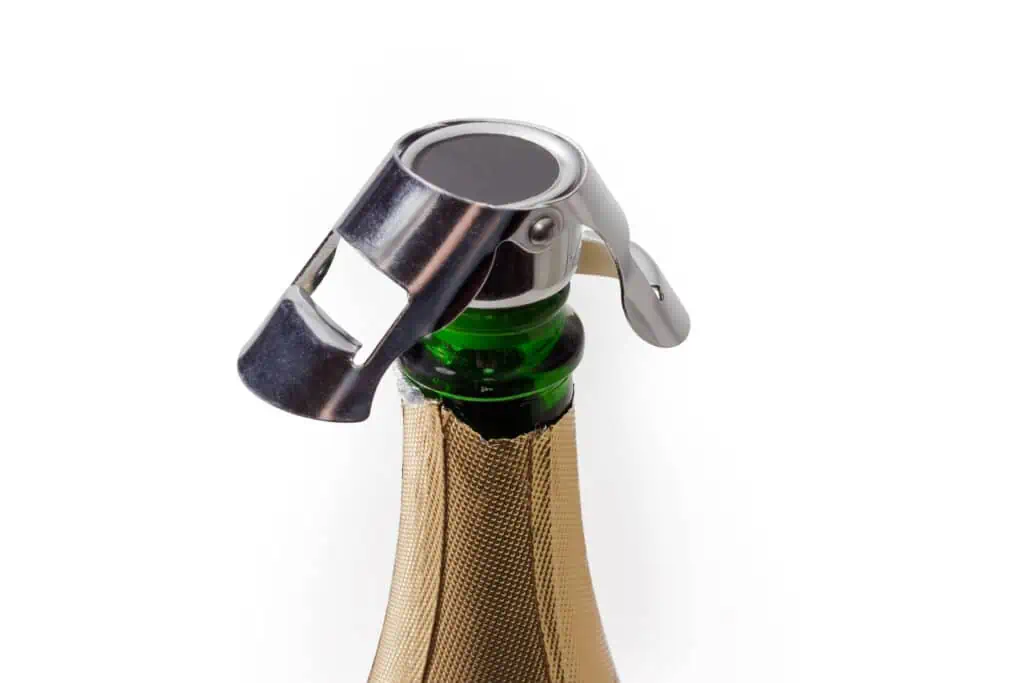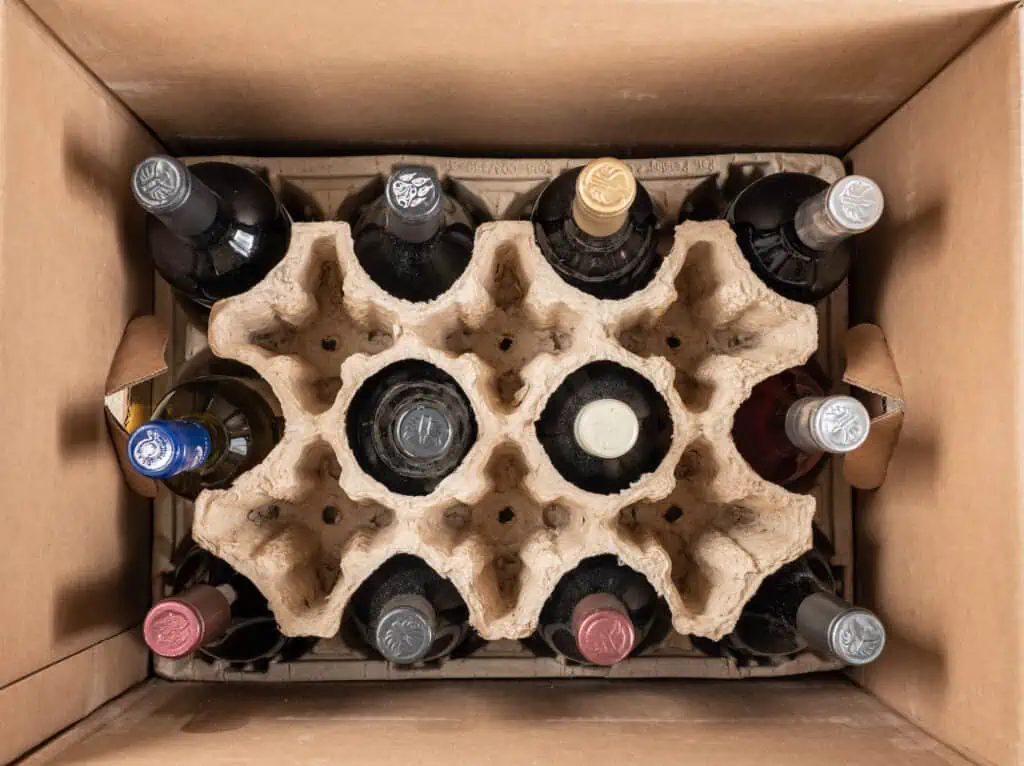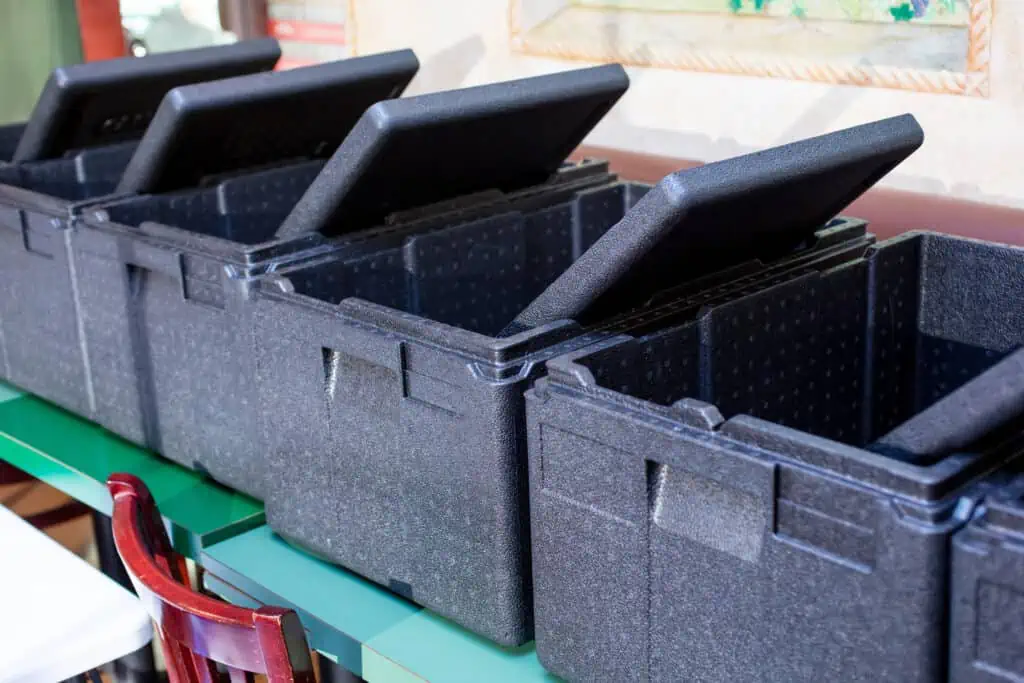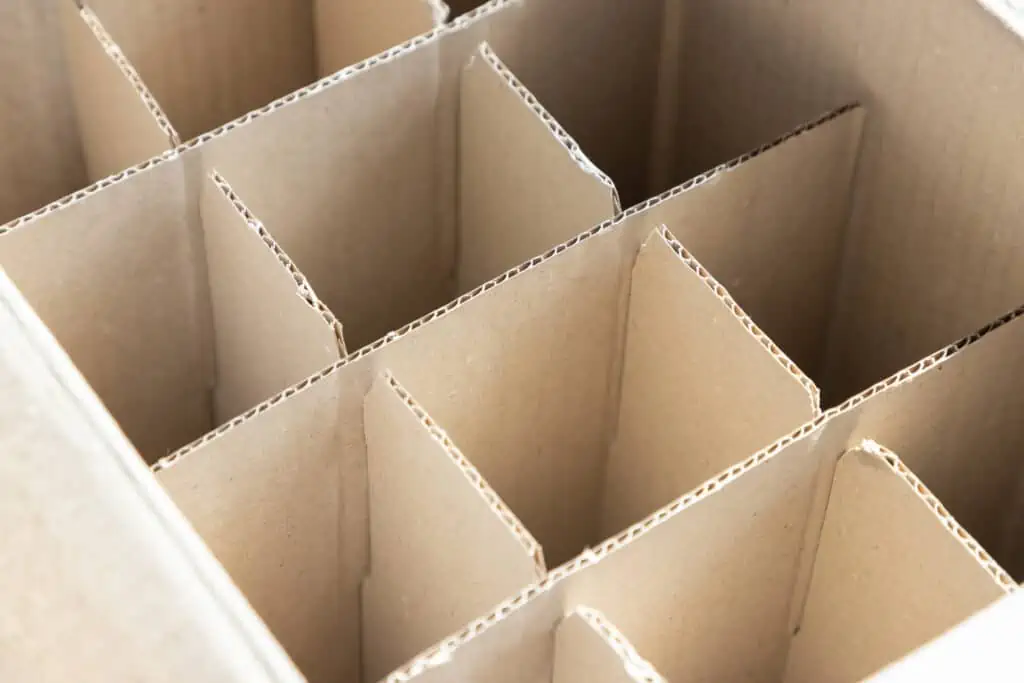What You Need To Know About Transporting Alcohol During a Move
Posted in: Moving Advice, Moving Checklists & PlanningHomebrewing isn’t as trendy as it once was, but that hasn’t stopped over a million Americans from making their own alcohol at home. According to the American Homebrewers Association, the country had around 1.1 million homebrewers in 2017, and the nation boasted about 500,000 home winemakers in 2023.
And it’s not just beer and wine. The sale of home cocktail kits increased by 40% in 2020, with DIY mixology still going strong into 2024. In the early 2020s, a cool and convenient at-home cocktail robot burst onto the scene, making home drinking even more fun.
But what happens when you need to move with all those bottles and all that equipment?
Whether it’s for a new job or to relocate somewhere with a lower cost of living, there are a few things to keep in mind when moving your home bar and alcohol stash — especially across state lines. Read on for advice on how to preserve your collection when moving.
Moving Alcohol: Not as Simple as It Sounds
Think you can just toss your bottles into the truck and move? Not so fast. Every state has its own rules about moving alcohol, and some are stricter than others. Before you load up, make sure you’re not accidentally breaking the law.
Keep in mind that different laws often apply to hard spirits. And, remember that rules differ for open or closed containers — so definitely don’t keep that leftover bottle of vodka in the passenger seat.
Check out this handy table for a high-level overview of some key regulations for your alcohol.
| State | Homebrew Transport Rule (For Personal Use) |
| Alabama | The sale, possession, or transportation of 5 gallons or more of liquor, wine, or malt beverages within the state is considered a felony. |
| Alaska | No transport limitation on alcohol for personal use. However, anyone seeking to sell alcohol within the state must obtain a Manufacturer Direct Shipment License. |
| Arizona | Requires anyone seeking to distribute or sell liquor, wine, or beer of any amount to obtain a license from the state. No special permit is needed to transport alcohol through the state. |
| Arkansas | Declares it unlawful to transport or distribute wine, spirits, or beer that didn’t originate within the state without a state-issued permit. |
| California | Allows transport of up to 60 liters for personal or household use. The law specifies international crossing, with no mention of interstate transport. |
| Colorado | Permits people to bring specified volumes of alcohol into the state for personal use without being subject to tax. Limits are 9 liters of wine, 6 liters of spirits, and 2 gallons of beer or cider. |
| Connecticut | Allows you to carry up to 4 gallons of liquor, beer, or wine into the state. Individuals may also receive shipments up to 5 gallons every 60 days, as long as the product originated within the territories or boundaries of the U.S. The limit is 5 gallons every 365 days for products originating outside of the U.S. Special permits apply for higher amounts. |
| Delaware | Allows the production of homemade alcoholic beverages of up to 200 gallons per calendar year; individuals can’t sell homemade alcohol. You may transport any amount for personal or family use, festivals, or beverage-tasting events. |
| Florida | Prohibits the transportation of alcoholic beverages of more than 12 bottles, with no specified volume limit. Common carriers and licensed transportation services are exempt from this statute but may require special permits. |
| Georgia | Differing requirements for in-state vs interstate transport. When transporting within the state, Georgia generally allows for 1/2 gallon of spirits, 576 fluid ounces of malt beverages, and 1/2 gallon of wine for personal use. When transporting from out of state, an excise tax is levied on amounts over 1 gallon of liquor, 2 standard cases of malt beverages, or 2 standard cases of wine. |
| Hawaii | Allows the production and sale of up to 200 gallons of liquor or wine, or 100 gallons of beer, as long as it’s produced and transported within the state. Hawaii requires a license for the transport of alcohol from outside the state where amounts exceed 1 gallon and 2 cases of beer for personal use. |
| Idaho | Allows the transport of legally obtained alcohol with no specified volume limit, as long as the container’s seal isn’t broken. |
| Illinois | Requires express permission for any organization or individual seeking to bring more than 1 gallon of alcoholic drink per year into the state. |
| Indiana | Highly complex laws and provisions cover the state’s transport and/or distribution of alcohol. Permits vary depending on the type of road used. Contact an Indiana legal professional for definitive answers regarding your specific alcohol transportation situation. |
| Iowa | Allows 9 liters of wine or liquor to enter the state per calendar month per person of legal age. For beer, this limit is 4.5 gallons. Individuals can apply for waivers for greater amounts. |
| Kansas | Requires a carrier to be bonded and hold a state-issued carrier permit to bring any amount of alcoholic beverage into the state, except for beer. However, state limitations regarding beer are vague. Consult a legal professional for specific laws concerning the transport of beer into and through Kansas. |
| Kentucky | Regulations regarding alcohol transport appear to apply only to common carriers. Consult a legal professional for specific laws concerning the transport of alcohol into and through Kentucky. |
| Louisiana | Prohibits the removal of micro-brewed or micro-distilled beverages from the production premises for sale to any outside wholesaler or retailer within the state. No specific permits are needed for transporting personal-use alcohol into or within the state. |
| Maine | Generally requires a license to bring alcohol into the state for personal use or resale, although no permits apply for less than 400 fluid ounces of malt liquor, 4 liters of wine, or 4 liters of low-alcohol spirits. |
| Maryland | Requires a permit to transport alcohol into or through the state from outside the state for any amount and for any purpose, including personal use. |
| Massachusetts | Requires a permit to transport alcohol into the state for any purpose, including personal use. The permit allows for the transport of any amount of alcohol for personal use. |
| Michigan | Allows 1 liter of liquor per 30-day period without prior approval. For alcohol at or below 21 percent alcohol by volume (ABV), the limit is 312 ounces per 30-day period. |
| Minnesota | Employs a 3-tier system that prohibits unlicensed importation of alcohol into the state, with some exceptions. Consult a legal professional for details about Minnesota liquor transportation exceptions. |
| Mississippi | Requires state-issued permits for the transportation of alcohol for distribution and sale in the state, with little reference to transportation for personal use. |
| Missouri | Allows the production and transport of up to 200 gallons of liquor or beer for personal use or use in public gatherings where the alcohol is free of charge. |
| Montana | Allows transport of up to 1 gallon at a time into and through the state for family or personal use. Individuals can bring 3 gallons from another state. |
| Nebraska | Allows transport of up to 9 liters of alcohol per calendar month for personal or family use. Any amount brought into the state for selling requires a state-issued permit. |
| Nevada | Permits the transport of up to 1 gallon of alcohol per month for personal use without a special license. Any alcohol brought into the state for sale requires a state-issued permit. |
| New Hampshire | Permits the transport of up to 3 quarts. Any alcohol under 6% ABV has no volume limit for personal or family consumption. Estate wineries and microbreweries may apply for a special license. |
| New Jersey | Permits transportation of up to 12 quarts of beer, ale, or porter, 1 gallon of wine, and 2 quarts of other alcoholic beverages within any consecutive 24-hour period for personal and family use. |
| New Mexico | Allows the production, transportation, and sale of craft beers, wines, and spirits produced within the state. There are no evident laws concerning transport from out of state, apart from licensed distributors and carriers. Consult a legal professional for specific information regarding your alcohol transportation into or through New Mexico. |
| New York | Requires individuals who bring in beer, wine, or hard cider from another state in large quantities for personal use to report the product on a tax form. |
| North Carolina | Allows the transport of a maximum of 24 standard 750ml bottles of wine per month, 4 liters of spirits, and 80 liters of malt beverages, such as beer, into the state for personal or family use. |
| North Dakota | Permits the production and transport of up to 27 liters of wine, 85.17 liters of beer, and 9 liters of any other alcoholic beverage for personal or family use. |
| Ohio | Prohibits the transport or sale of alcohol from out of state without a permit, whether for commercial or personal use. |
| Oklahoma | Requires a permit to transport up to 200 gallons of alcohol annually into the state for personal use. You must pay applicable excise taxes. You also need a permit to make alcohol at home in the state. |
| Oregon | Doesn’t prohibit the production of alcohol for personal or family use. No provisions could be found relating to the transport of alcoholic goods outside of commercial or common carrier requirements for mass distribution. |
| Pennsylvania | Prohibits the transportation of alcohol into the state, except with a license to ship sacramental wine, import, or operate as a direct wine shipper. |
| Rhode Island | Does not allow out-of-state distilleries to ship into the state. No provisions are available concerning transport for personal use of any alcoholic product. Consult a legal professional for more detailed information concerning transporting alcohol into or through Rhode Island. |
| South Carolina | Statutes pertain to the commercial shipment of beer, wine, and spirits, with no mention of transportation for personal use. |
| South Dakota | Allows for 200 gallons of homemade malt beverages, cider, or wine per year to be produced and transported within the state. Statutes make no mention of transport from out of state. |
| Tennessee | Allows production and transportation of up to 100 gallons per year, as long as the product isn’t made for sale. |
| Texas | Allows 288 fluid ounces of malt beverages, 3 gallons of wine, and 1 gallon of distilled spirits to be transported into the state for personal use. Amounts exceeding the specified limits require a permit. |
| Utah | Allows residents to bring up to 9 gallons of alcohol into the state without penalty, as long as it’s for personal use. Consult a legal professional if you’re from out of state and looking to transport alcohol into Utah. |
| Vermont | Allows transport of 8 quarts (2 gallons) of wine, liquor, or both, and 6 gallons of malt beverage without obtaining a permit, as long as it’s for private use and moved in a personal vehicle. |
| Virginia | Allows up to 3 gallons of wine, spirits, or beer to be transported into and throughout the state for personal use. |
| Washington | Allows transport of up to 2 liters of spirits, wine, hard cider, or 288 ounces of beer from another state per calendar month without requiring a license, as long as it’s for personal consumption and not for sale. |
| West Virginia | Consult a legal professional for guidance, as laws don’t explicitly cover alcohol transportation. |
| Wisconsin | Allows you to bring any amount into the state as personal goods if you move from another state or country. If you’re returning from a visit to another country, you’re permitted to bring 4 liters home with you. Transport from out of state for any use requires a state-issued permit. |
| Wyoming | Allows transport of 3 liters of liquor, 9 liters of wine, or 5 gallons of malt beverage into the state at any time for personal consumption. |
This article’s representation of laws or statutes is according to the author’s best understanding at the time of publication. The author of this article holds no degree or certification in law for any state. Seek qualified legal counsel before attempting to transport any amount of wine, beer, or spirits across state lines.
Can You Put Alcohol in a Moving Truck?
In general, you should avoid loading large amounts of alcohol into a moving truck. Temperature changes aren’t kind to wine and beer, and moving trucks usually have bad climate control in the cargo areas. For the best chance of making sure your drinks are still drinkable, take them in your own vehicle.
“Beer should be kept between 37 and 45 degrees Fahrenheit, and wine between 55 and 65 degrees Fahrenheit.”
That said, some moving companies might not let you load up your alcohol with your other possessions at all; it depends on where you’re located, where you’re traveling, and the company’s policy.
Don’t be tempted to just sneak your alcohol onto the truck, either — the driver can get into hot water if pulled over. Your collection could be seized, and you might be slapped with fines or taxes. Plus, if the containers break, you’re not only stuck with a messy, booze-soaked situation and damaged belongings, but the moving company won’t pay out for any contraband-caused mess.
If you absolutely can’t transport a large alcohol collection any other way, a specialized moving truck might be in order.
Making Sure You Don’t Lose a Single Drop
If you’re a wine, whiskey, or cocktail enthusiast moving your collection, it’s important that every bottle makes it to your new place in one piece. Skimping on storage, packaging, and insurance makes for an expensive accident just waiting to happen. Keep the following in mind when transporting your alcohol.
Know (and Protect) What Your Collection Is Worth
Liquor can be expensive. As any connoisseur knows, a prized collection of rare wines and spirits has a similar price tag to fine art or jewels. For example, just take this bottle of Emerald Isle that sold for a record $2.8 million! One-of-a-kind vintage wines, rare whiskies, or exotic spirits are irreplaceable.
If you have rare or unique bottles, hire an appraiser to document their monetary worth. Insurance is also a must!
When it comes to insurance, it’s well worth it if any bottles have a price tag of $500 or more. You can even do by-the-bottle floater coverage, which rarely includes a deductible. Although insurance can’t compensate you for sentimental loss, it can make sure you’re not out of pocket if the unthinkable happens.
If your whole collection costs less than $1,000, check your homeowner’s policy. Wine and liquor collections often count as personal property for coverage.
Don’t take risks! Always hire movers with experience handling high-value goods. If your collection’s value isn’t high enough to justify the cost of specialized movers, carry it safely in your personal vehicle.
Keep Things Cool, and Consider Temperature Control
Alcohol expands when it gets hot — and no one wants a surprise cork pop in transit. Even worse, spilled alcohol in a small space becomes a fire hazard. This becomes a problem when the cargo area of a moving truck gets warm. Here’s how to keep your bottles at the right temperature.
Hire a thermal-controlled moving truck or stock up on thermal containers — such as coolers or insulated crates — to store your collection. Beer should be kept between 37 and 45 degrees Fahrenheit, and wine between 55 and 65 degrees Fahrenheit.
Also, keep clear and light-colored bottles in the dark. Ever chugged on a skunky beer? Blame the light! Hot hops plus UV light is not a good combination. Sunlight is equally unkind to wine, whiskey, and other spirits.
Liquid Should Stay Inside the Bottles

Obviously, opened bottles increase the leak risk even more. And, if air gets in, wine turns to vinegar and beer tastes like old pennies.
Re-corking wine bottles is all good for a night on the kitchen counter. But, when moving, make your wines airtight with silicone stoppers. For opened bottles of spirits, their original cap should be enough to keep the contents from spilling.
All that said, keep in mind that most states have open container laws, making it illegal to carry unsealed alcohol containers anywhere except in a trunk or cargo space.
See prices for local moving labor. Read real customer reviews. Easily book your help online.
Have the Right Materials for the Job
As you now know, moving your booze isn’t as simple as tossing it all into a box and hitting the road. Proper packaging is key. Reduce the chance of broken bottles or your booze going bad with the following:
- Wine moving boxes: You can find boxes designed to hold and ship wine from major retailers such as Amazon. U-Haul also provides wine shipping kits that come with extra-secure Styrofoam inserts.
- Bubble wrap: If you aren’t using a specialized shipper, plenty of bubble wrap around bottles helps protect them. Cardboard dividers also help keep bottles from clinking together.
- Thermal shipper: Specially designed box inserts help keep beverages cold while being transported.
- Ice: Pack coolers with plenty of ice to keep the contents chilled.
- Packing tape: Make sure your boxes/shippers are sealed tightly so the contents can’t break free.
How Do I Pack…?
Wine bottles

Although experts usually say to store wine bottles tilted (to stop the cork drying out), doing this in transport is just asking for spills to happen. Instead, keep the humidity at around 70%, and you won’t have to fear your corks drying.
Beer bottles
Protect each beer bottle with packing paper or bubble wrap before nestling them in individual shippers. Alternatively, keep them snug in a padded box. Cardboard separators further prevent clanging and breaking.
“When it comes to insurance, it’s well worth it if any bottles have a price tag of $500 or more. You can even do by-the-bottle floater coverage, which rarely includes a deductible.”
Although cans are a bit more forgiving, still give them plenty of padding so they don’t bump on the sides of the box. Plus, the less they move, the less likely they’ll explode when you crack one open later on.
Liquor bottles
Liquor bottles require some extra care — very secure caps and plenty of wrapping. Slide them tightly into the box, with extra packing paper so they don’t rattle around. No shaking or stirring is needed in transit.
Pro tip: Group bottles of similar size together, and don’t overload boxes.
Glassware and bar equipment
Delicate glassware? Here’s where cardboard dividers are your savior. Stuff each section with plenty of packing paper or clothes for a gentle ride. Give pricey glasses, such as crystalware, even more care with a specialized shipper.
Because homebrewing gear and other alcohol accessories are usually made of stronger materials, pack them separately from the breakables. For your bar cart, remove the casters and transport it with the rest of your furniture.
Moving alcohol across state lines can certainly seem like a bigger headache than a hangover. So unless you have a valuable wine or liquor stash, it might be best to wave farewell and replace your collection once you’ve settled into your new place.
However, if you’re still set on taking your alcohol with you to your new abode, get professional legal advice to make sure everything’s above board. And, be sure to pack your bottles and equipment properly for a safe journey.









